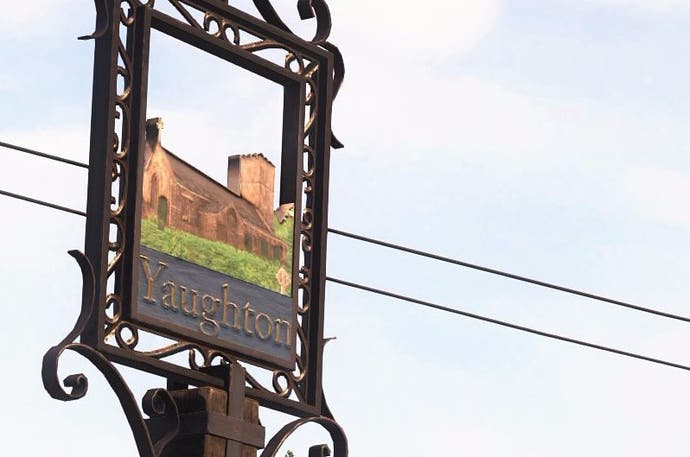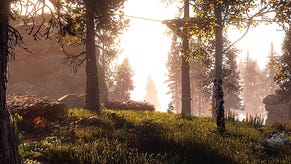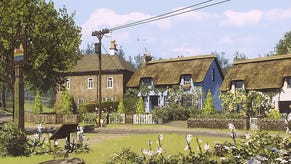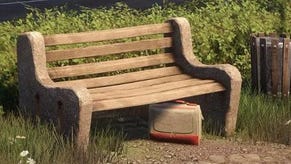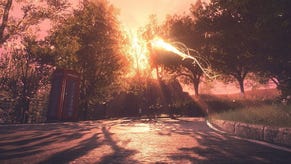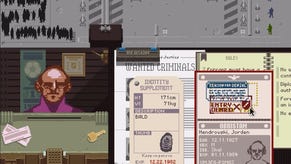Everybody's Gone to the Rapture and the particular joy of the British apocalypse
Rapture's delight.
"When a day you happen to know is Wednesday starts off by sounding like Sunday, there is something seriously wrong somewhere."
Of all the ways to announce an apocalypse, this is my very favourite - the end of civilisation loudly un-trumpeted by the disruption of schedules and the not-working of things. It comes from John Wyndham's The Day Of The Triffids, a book which sprang to mind recently when I saw some more of The Chinese Room's deserted, post-event mystery, Everybody's Gone To The Rapture.
I already knew that the game spoke to me in a very particular way. The announcement trailer features audio taken directly from the superbly creepy public information series Protect And Survive, which is full of utterly terrifying sound effects, a uniquely British attitude to certain annihilation, and an unacknowledged futility related to the barricading of domestic detritus against the might of nuclear blasts. Last year's E3 trailer includes ghostly chants from a numbers station, those unexplained beacons of paranoia and conspiracy used, it seems likely, for espionage during the Cold War.
Everybody's Gone To The Rapture, in other words, has been pushing all of the buttons and sensitivities my subconscious developed while growing up in the dread shadow of the bomb. So when I saw more of the game, and it forged links with my favourite strand of desolate British fiction, it felt like not so much like a nuclear winter as a glowing radioactive Christmas.
The Day Of The Triffids is the most famous example of what Brian Aldiss rather pejoratively called a "cosy catastrophe" and what Wyndham himself preferred to describe as "logical fantasy". In the 1950s there was a condensed run of peculiarly British ways of imagining the end of the world, and the parts small people like us might play in it. As well as Wyndham's novels this includes John Christopher's The Death of Grass and The World In Winter, Nevil Shute's emotionally brutal On The Beach, and Charles Eric Maine's The Tide Went Out.
These are spiralling post-war anxieties, tight knots of nuclear worry, agricultural concern and industrial disquiet emitted from a shrinking Empire full of still-capable men. They vary in mode of disaster and moral severity. Wyndham's novels tend to be cosiest, with protagonists who are basically somebody's dad making a contemplative pot of tea while deciding what to do about a blown over fence - except it's not a fence, of course, but the government. Other scenarios are darker, right up to what Robert Macfarlane calls the "pragmatic atrocity" of Christopher's displaced urbanites, who embrace a ruthless feudalism more or less the moment they cross the Watford Gap. But what all these books have in common is that they are stoic and precise contrasts of ordinary Britishness - of A roads, radio sets and post vans - with the devastating, and devastatingly possible, end of everything.
I love this determined strand of literary despair, and so does The Chinese Room.
Everybody's Gone To The Rapture presents us with an end much like this, a catastrophe snug in the green heart of England. It's set in 1984 - that archetypal cross on the British dystopian calendar - and in the gloriously named town of Yaughton, a name I love partly because it's perfectly English (like Wyndham's affectionate branch line of place established in The Midwich Cuckoos - Trayne, Stouch, Oppley...) and partly because, I imagine, it's rather difficult for Americans to say.
This isn't snobbery - or at least, not just snobbery. Yaughton is the antithesis of a science fiction that the author M John Harrison describes as "an index of the American-ness of the coming world." These books, and this place, is a wry, grounded response to that index (alive and well in games from Gears Of War to Fallout) and a place where everything is local and specific. Yaughton has a white welcome sign with a small arch at the top and "Please drive carefully" written underneath. It has a red phone box planted on a grassy roadside bank. It has wooden telegraph poles strung with taut wires, a field with rugby posts and a small climbing frame, a church with a wooden lychgate, and a bus stop with a pinned notice announcing "EMERGENCY TOWN MEETING." It is pointedly, beautifully ordinary.
This contrast between the mundane and the monumental is special because when truly traumatic and life-altering things happen to us, they are mundane. I have been in two serious car crashes in my life, crashes the cars didn't survive but which I did, and neither was announced or dramatic. There was instead a slowness, a graceful, impervious flow of something simply happening.
After the first crash I ran to our village train station (Cuxton - Wyndham would have approved) so I wouldn't miss a game of rugby at school. Before the second, which signalled the end of my Peugeot 206, I was driving along an icy A1 covered with a fresh layer of snow when a kink in the feedback from the wheel let me know I had lost control. "Oh, I'm sorry" I said to my wife and, as the wheels let go their hold on the road and the Peugeot turned slowly to face the traffic behind us, she said "That's okay."
There's a peculiar similarity in the background of the authors who defined this quietly devastating fictional space. Shute and Maine were both engineers and RAF pilots, while Wyndham and Christopher, who also had military experience, both worked for the government in different capacities. They were, in other words, practical men, used to being organised and hands-on in an era of things which could be felt and fixed, an era which persisted into the 1980s.
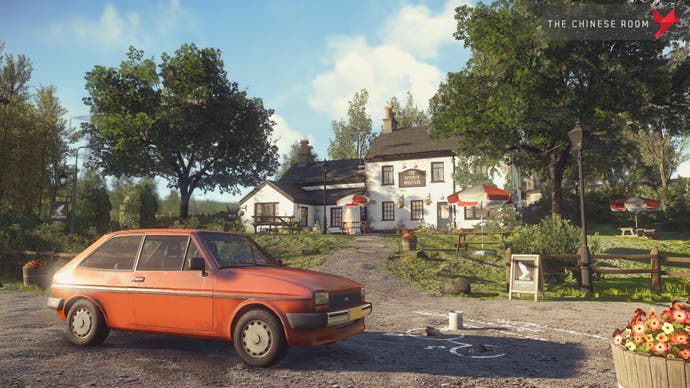
According to creative director Dan Pinchbeck, story in Everybody's Gone To The Rapture is delivered to us through these things - through radios, phones and television sets. The distorted noises and analogue voices that carry this story - automated messages, warning signs, electronic communications - are the rattle and call of the physical framework of our civilisation (a civilisation which, in 1984, was still wired rather than wireless.) It is story told to us through the workings and engineering that defined these fictional worlds, and the men who imagined them.
It is also a story told to us through empty space. While the logical fantasies favoured a gradual reveal of their disasters - ever more urgent infringements on the regularity of life until the awful whole is revealed - Everybody's Gone To The Rapture asks us to do the reverse, recovering a disaster from the emptiness it has left behind. Partly this is a function of gameplay - like Gone Home, Rapture is a slightly unreal excavation of a particular time and place - and partly it is an echo of real sites of devastation. Ghostly golden figures appear in the game, replays and remnants that archive past events with the same eerie absence as chalk outlines or, more pertinently, the scorched shadows of bomb blast victims.
There is something else to these ideas of absence and presence, a specific hook to deserted places. It happens at the start of Triffids (a scene copied for the beginning of 28 Days Later) with Bill waking up in an apparently empty hospital. It happens in The World In Winter, with an expedition through a frozen, abandoned London. It happens in On The Beach, with a submarine mission scouting dead ports of the American East coast for signs of life. These unsettling scenes, which feel somehow like trespasses, interruptions of a terrible reverence, are versions of fantasies we have as children in which every secret space is open and available to us, games we would be afraid to play if we knew the cost of making them real.
Perhaps that's why there is an element of nostalgia with Everybody's Gone To The Rapture. Not necessarily one for anything as simple as "the past", but for a time which brought into sharp focus the ordinariness of dread and the mundanity of the potentially spectacular end of the world. The England I grew up in is one of green fields and pylons, a place to run through fields and lie under the sun, before curling up to my dad and asking him to explain the bomb in a warm bed in which I will get no sleep. That is the power of the particularly British apocalypse invoked by the meticulous sense of place in Everybody's Gone To The Rapture, which makes disaster so homely and human.
